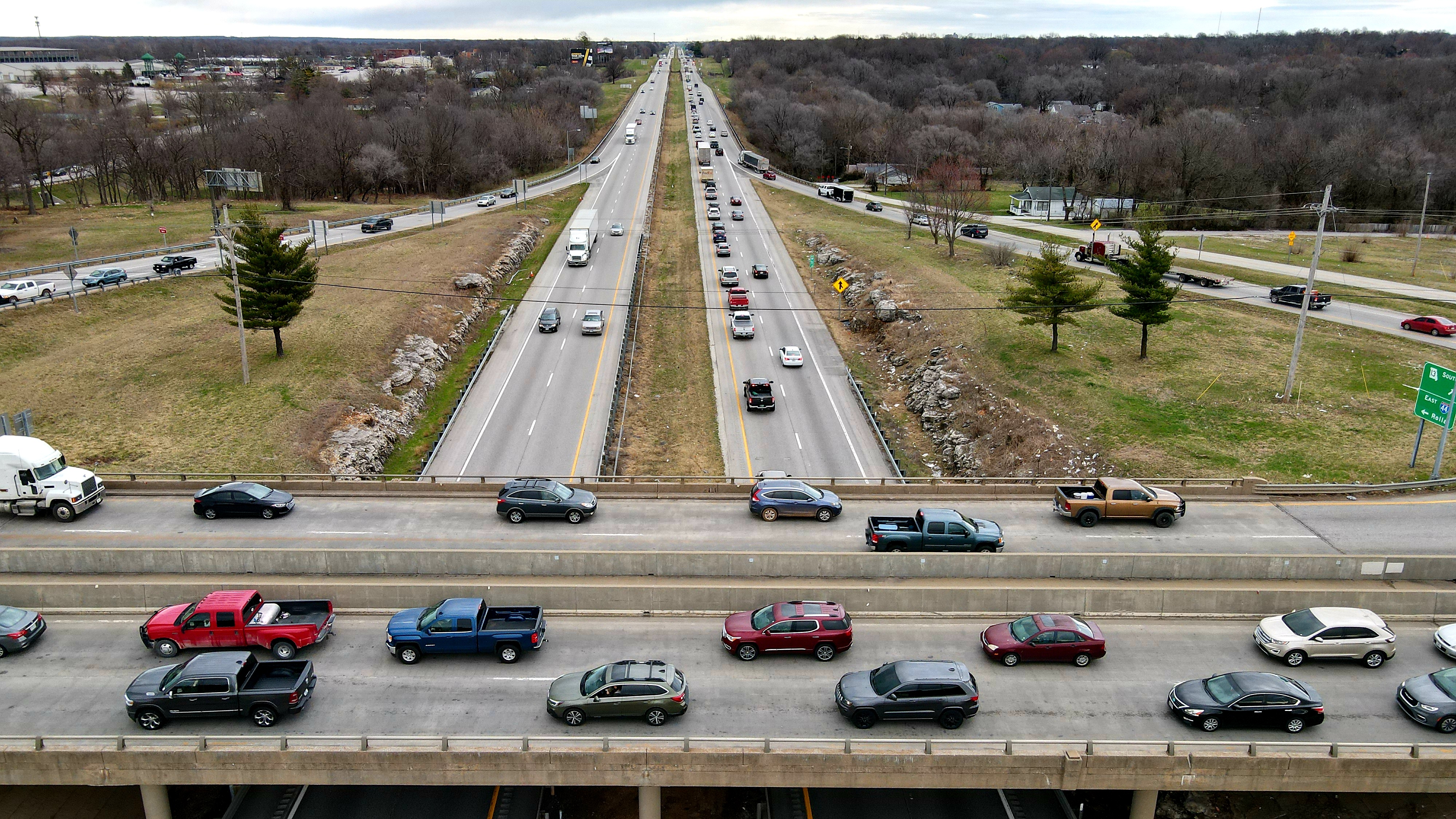The Springfield City Council made a $2 million commitment to try to widen part of Interstate 44 to six lanes, and now waits for word from the federal government as to whether or not construction will be funded.
The City Council voted 9-0 to enact a resolution pledging $2 million toward the Missouri Department of Transportation’s effort to obtain a 2022 Infrastructure for Rebuilding America (INFRA) grant. The Greene County Commission has already pledged $1 million toward the effort.
Summary
The Ozarks Transportation Organization is a metropolitan group that makes decisions about transportation projects and development in Springfield and the surrounding area. Its members plan to ask the federal government for $70 million to fund about $120 million worth of work on Interstate 44 and the Highway 13/Kansas Expressway interchange.
The Ozarks Transportation Organization (OTO) contacted the city of Springfield and Greene County about getting help preparing an application for a federal infrastructure grant for the Springfield region. As Greene County Highway Administrator Adam Humphrey explained to the county commission in March, the plan is to widen about 4.7 miles of I-44 from Kansas Expressway east to U.S. Highway 65.
Springfield Assistant Director of Public Works Kirk Juranas said the diverging diamond interchange at Kansas Expressway and I-44 opened in 2009, but an effort to improve the interchange is part of the overall project.
“It's functioned well for us, but we're beginning to see backups and delays of up to 20 minutes, and we're currently studying with the DOT and the Ozarks Transportation Organization options to see if we can't make that better,” Juranas said.
When could construction begin?
Even with the City Council vote on May 2, that doesn't mean Springfield drivers should expect to see orange cones and construction workers on I-44 anytime soon. Juranas explained that the project is dependent on a federal funding award, and that the effort at present is very early.
“If the grant is awarded, what is the timeframe for execution and completion, do you know?” Councilwoman Heather Hardinger asked.
“The plan is to begin acquisition of right of way, which would mostly be there at the Kansas, Route 13 and Route 44 interchange; that would begin next year in 2023,” Juranas said. “In 2024 would be environmental, where there would be some sound wall studies to see if they are warranted, and then it's anticipated that construction would begin in 2025.”
In an explanation to the resolution, Springfield Assistant Director of Public Works Martin Gugel gave a breakdown of what Springfield’s $2 million would do — connect Doling Park and Fulbright Spring Park with a trail that passes under I-44.
“The city’s match would go toward the cost of the box culvert, which will serve as this new trail connection,” Gugel wrote in a city council document attached to the resolution enacted Monday night.
Gugel added that an I-44 widening project would create the chance to improve pedestrian underpasses at points where I-44 intersects Broadway, Grant and National avenues. Gugel also identified sources of funding for the $2 million pledge: $1.6 million in Federal Surface Transportation block grant and $400,000 from Springfield’s ⅛-cent transportation sales tax.
Juranas added that high inflation rates make it difficult to determine an actual cost for the project.
Who is impacted?
Springfield residents and commuters
Business and property owners along the I-44 corridor
Greene County, Springfield and state taxpayers
Truckers and commercial drivers
The Ozarks Transportation Organization identified widening I-44 as a top priority because it serves as a major freight corridor for companies headquartered in northern Springfield, and as a key route for freight going to and from the Springfield-Branson National Airport. In March 2022, the UPS and FedEx shipped more than 1.1 million pounds of cargo from Springfield, and deplaned more than 1.7 million pounds of cargo, for a total of more than 2.9 million pounds of cargo handled in a single month.
The OTO also identified I-44 as a critical project because of its tourism value for Springfield.
The U.S. Department of Transportation’s Federal Highway Administration (FHWA) announced that it is providing $52.5 billion in funding to all 50 states and the District of Columbia under the Bipartisan Infrastructure Law, also known as the Infrastructure Investment and Jobs Act.

The $52.5 billion represents an increase of more than 20 percent year-over-year for Federal-aid Highway Program funding. Each year, money for the FHWA Federal-aid Highway Program is dolled out according to a statutory formula contained in the Bipartisan Infrastructure Law.
Congress authorizes Federal-aid Highway Program funding each year to assist state transportation agencies for construction, reconstruction and improvement of highways and bridges and for other special-purpose programs and projects. The Bipartisan Infrastructure Law establishes or continues FHWA programs and authorizes funding for those programs from the Highway Trust Fund.
The FHWA distributes funds through a process known as apportionment, using a statutory formula to determine the amount of money available to each state.
Based on the funding formula, Missouri would expect to receive approximately $7 billion in federal highway funding for highways and bridges over five years. According to a statement from U.S. Secretary of Transportation Pete Buttigieg, Missouri can also expect to receive approximately $159 million over five years in formula funding to reduce transportation-related emissions, in addition to about $180 million over five years to increase the resilience of the Missouri transportation system.

